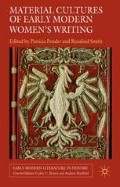Abstract
On 19 November 1845, Henrietta Halliwell-Phillipps started to transcribe a manuscript of an early modern play, noting in her diary: ‘I began to copy another MS. Play sent him [ie her husband, James Orchard Halliwell] by Mr Larking called “Love’s Victorie” found among Sir T. Dering’s MSS’ (240).1 Henrietta was a highly skilled copyist, trained by her father, the obsessive early nineteenth-century book collector Sir Thomas Phillipps.2 Henrietta’s is a rather romantic story, especially if you have the sensibility of a bibliophile. Her irascible, eccentric father had amassed a remarkable collection of books and manuscripts when, in 1842, he entertained James Orchard Halliwell, who had first written to him as a precocious Cambridge undergraduate.3 Halliwell and Phillipps’s eldest daughter Henrietta fell in love, and subsequently eloped after Phillipps’s anger was roused over the issue of Henrietta’s dowry. Phillipps’s fury continued unabated after Henrietta and James married, and he directed a great deal of it against Halliwell, who had most probably engaged in some slightly shady practices in relation to the theft of certain Cambridge manuscripts. Phillipps constantly tried to ruin Halliwell’s budding career as a professional man of letters, and he cut off virtually all contact with his daughter until his death in 1889. (In something of a nose-thumbing gesture, albeit scarcely a brave one, upon Phillipps’s death, James and Henrietta changed their last name to Halliwell-Phillipps.)
Access this chapter
Tax calculation will be finalised at checkout
Purchases are for personal use only
Preview
Unable to display preview. Download preview PDF.
Notes
References to the diary of Henrietta Halliwell-Phillipps, Edinburgh University Library MS HP. Coll 327. A selection from the diary has been edited by Marvin Spevack, A Victorian Chronicle: The Diary of Henrietta Halliwell-Phillipps (Hildesheim: Georg OlmsVerlag, 1999); see p. 26 for the quotation. For an excellent brief account of the Halliwell-Phillipps version of Love’s Victory, see Arthur Freeman, ‘Love’s Victory: A Supplementary Note’, The Library, 19 (1997): 252–4.
Biographical information is taken from Marvin Spevack, James Orchard Halliwell-Phillipps: The Life and Works of the Shakespearean Scholar and Bookman (New Castle, DE: Oak Knoll Press and London: Shepheard-Walwyn, 2001).
The greatest part of Dering’s collection was acquired between 1619 and 1624; for a detailed account, see T. N. S. Lennam, ‘Sir Edward Dering’s Collection of Playbooks, 1619–1624’, Shakespeare Quarterly, 16 (1965): 145–53.
James Orchard Halliwell, ed., Shakespeare’s Play of King Henry the Fourth (London: Shakespeare Society, 1845).
See the modern edition edited by George Walton Williams and G. Blakemore Evans, The History of King Henry the Fourth as Revised by Sir Edward Dering, Bart. (Charlottesville, VA: Folger Shakespeare Library, 1974). The cast list is not for Henry but for Fletcher’s The Spanish Curate, with the cast written on the back of a piece of paper containing additional lines intended for Henry in the amalgamated script. Dering himself is listed as playing the lead role of Don Henrique in Fletcher’s play, see pp. 2–3.
James Orchard Halliwell, ed., The Marriage of Wit and Wisdom (London: Shakespeare Society, 1846).
References to James Orchard Halliwell, ed., A Brief Description of the Ancient & Modern Manuscripts Preserved in the Public Library, Plymouth (London: C. and J. Adlard, 1853).
See my brief discussion in Paul Salzman, Reading Early Modern Women’s Writing (Oxford: Oxford University Press, 2006), p. 70.
For detailed descriptions of the two manuscripts, see Michael Brennan’s introduction to his edition of the Penshurst manuscript, Lady Mary Wroth’s Love’s Victory: The Penshurst Manuscript (London: Roxburghe Club, 1988), pp. 16–20. The Penshurst binding includes an elaborate cipher referencing Pamphilia, Amphilanthus and ‘Mary Sidni’ [i.e. Wroth].
See the summarising discussion in Margaret P. Hannay, Mary Sidney, Lady Wroth (Farnham: Ashgate, 2010), pp. 218–19.
Gavin Alexander has suggested that the ‘Pamphilia to Amphilanthus’ manuscript (Folger V.a.104) may have originally had the same binding and that they were ‘paired’ presentation manuscripts, possibly for William Herbert: see Gavin Alexander, Writing After Sidney (Oxford: Oxford University Press, 2006), p. 307.
See Josephine A. Roberts, ‘The Huntington Manuscript of Lady Mary Wroth’s Play “Loves Victorie”’, Huntington Library Quarterly, 46 (1983): 156–61.
Matt Cohen, The Networked Wilderness: Communicating in Early New England (Minneapolis, MN: University of Minnesota Press, 2009).
Joyce Green Macdonald, ‘Ovid and Women’s Pastoral in Lady Mary Wroth’s Love’s Victory’, SEL [Studies in English Literature], 51 (2011): 449.
Mary Poovey, Uneven Developments: The Ideological Work of Gender in Mid-Victorian England (London: Virago, 1988).
See Alison Findlay, Stephanie Hodgson-Wright and Gweno Williams, ‘Elite Fabrications: Staging Seventeenth-Century Drama by Women’, in Culture and Change: Attending to Early Modern Women, eds Margaret Mikesell and Adele Seeff (Newark, NJ: University of Delaware Press, 2003), pp. 375–6.
Editor information
Editors and Affiliations
Copyright information
© 2014 Paul Salzman
About this chapter
Cite this chapter
Salzman, P. (2014). Henrietta’s Version: Mary Wroth’s Love’s Victory in the Nineteenth Century. In: Pender, P., Smith, R. (eds) Material Cultures of Early Modern Women’s Writing. Early Modern Literature in History. Palgrave Macmillan, London. https://doi.org/10.1057/9781137342430_9
Download citation
DOI: https://doi.org/10.1057/9781137342430_9
Publisher Name: Palgrave Macmillan, London
Print ISBN: 978-1-349-46534-7
Online ISBN: 978-1-137-34243-0
eBook Packages: Palgrave Literature CollectionLiterature, Cultural and Media Studies (R0)

